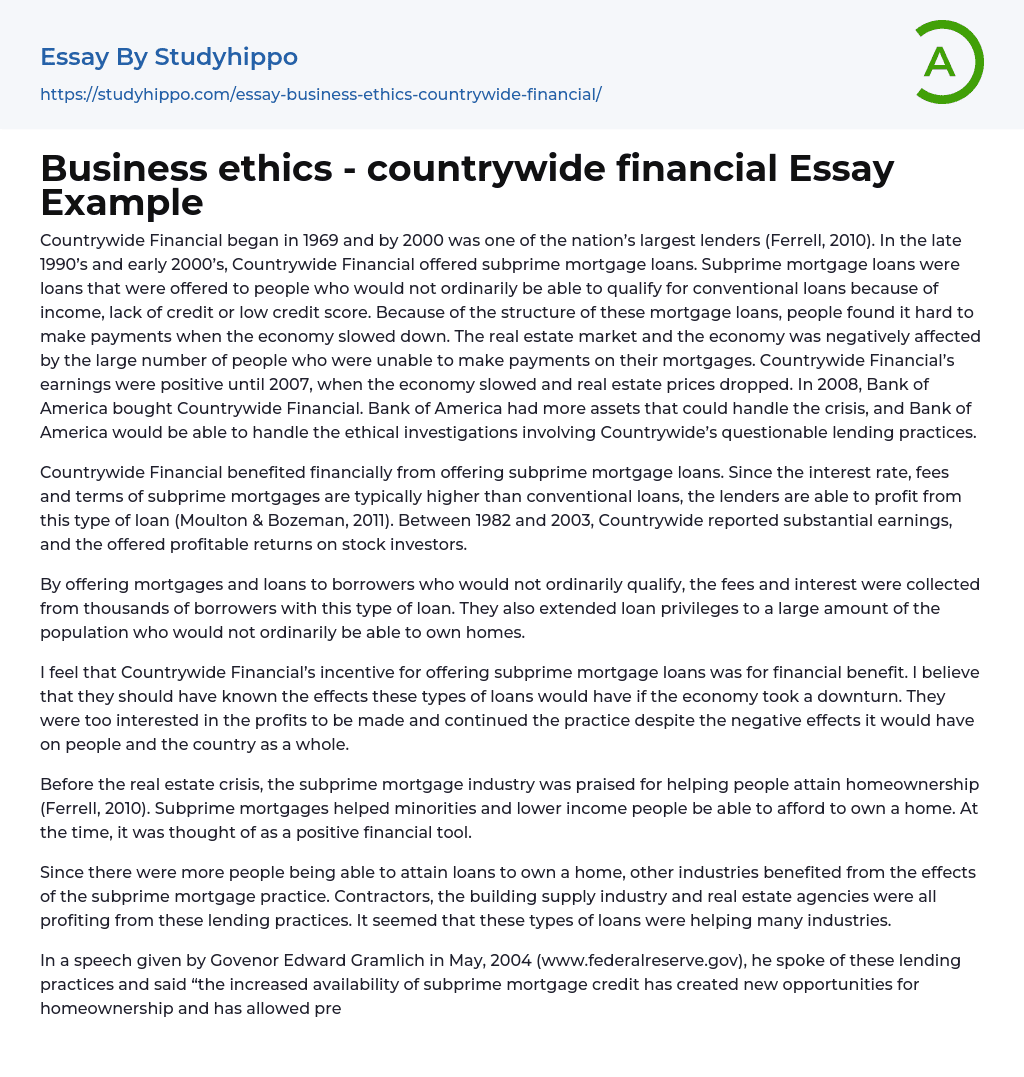Established in 1969, Countrywide Financial became a major lender by providing subprime mortgage loans to individuals who wouldn't normally qualify for conventional loans, such as those with low income, no credit history, or poor credit scores. However, when the economy slowed down, many people struggled to repay these mortgages. This had a negative impact on both the real estate market and the overall economy because a large number of individuals couldn't meet their payment obligations.
Countrywide Financial's financial situation worsened in 2007 due to economic slowdown and declining real estate prices. To address potential crises resulting from this situation, Bank of America acquired Countrywide Financial in 2008. This acquisition was advantageous for Bank of America since it had larger assets and could handle the ethical investigations related to Countrywide's questionable lending practices.
Countrywide Financial profited from providing subprime mortg
...age loans, which typically have higher interest rates, fees, and terms compared to conventional loans (Moulton & Bozeman, 2011). From 1982 to 2003, Countrywide reported significant earnings and attracted profitable returns for stock investors.
The opportunity for home ownership was provided to a considerable number of individuals who would typically be ineligible, through the collection of fees and interest from multiple borrowers approved for mortgages and loans.
Countrywide Financial's main motivation for offering subprime mortgage loans was financial gain. They consciously chose to prioritize their profits and continued with this practice, despite being aware of the potential consequences during an economic downturn. Unfortunately, they disregarded the negative impact it would have on both individuals and the nation.
Prior to the real estate crisis, the subprime mortgage sector received commendation for its rol
in enabling individuals to achieve homeownership (Ferrell, 2010). By making homeownership feasible for minorities and those with lower incomes, subprime mortgages were initially regarded as a beneficial financial instrument.
The subprime mortgage practice resulted in more individuals being eligible for home loans, which in turn benefitted various industries including contractors, the building supply industry, and real estate agencies. It appeared that these lending practices were advantageous for multiple sectors.
In a speech given by Govenor Edward Gramlich in May, 2004 (www.federalreserve.gov), he discussed the lending practices, stating that the increased availability of subprime mortgage credit has provided new opportunities for homeownership. This has allowed homeowners who were previously credit-constrained to borrow against their home equity for various purposes. However, the leaders of lending organizations should have anticipated the potential negative consequences of these practices in the future.
As CEO of Countrywide Financial, I would have implemented a structured evaluation system for salespeople based on their education and experience. Additionally, I would have required managers to evaluate the loans processed within their departments. Both managers and employees would be expected to adhere to specific guidelines for loan approval, with the understanding that they would be held accountable for any violations of these guidelines.
Countrywide Financial engaged in the practice of offering "liar loans," which refers to loans where no documentation of income or employment was required by loan officers (Ferrell, 2010). This unethical practice allowed individuals with minimal or no income to obtain loans, ultimately leading to inevitable foreclosure. As the CEO of Countrywide Financial, I would impose a ban on such business practices in order to safeguard both the company and
the consumers.
- Values of Life essays
- Ethical dilemma essays
- Normative Ethics essays
- Virtue Ethics essays
- Belief essays
- Deontology essays
- Moral essays
- Virtue essays
- Work Ethic essays
- Board Of Directors essays
- Brand Management essays
- Business Ethics essays
- Business Management essays
- Change Management essays
- Comparative Analysis essays
- Decision Making essays
- Dispute Resolution essays
- Knowledge Management essays
- Leadership essays
- Leadership and Management essays
- Manager essays
- Operations Management essays
- Performance Management essays
- Product Management essays
- Project Management essays
- Quality Management essays
- Risk essays
- Risk Management essays
- Scientific Management essays
- Stress Management essays
- supply chain management essays
- Time Management essays
- Total Quality Management essays
- Acceptance essays
- Age Of Enlightenment essays
- Child Observation essays
- Confucianism essays
- Conscience essays
- Critical Reflection essays
- Destiny essays
- Determinism essays
- Empiricism essays
- Environmentalism essays
- Epistemology essays
- Ethics essays
- Ethos essays
- Existence essays
- Existentialism essays
- Fate essays
- Free Will essays




